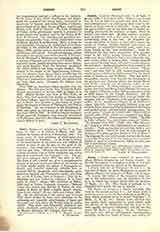

Jason, a Greek name adopted by many Jews whose Hebrew designation was Joshua (Jesus). In the Old Testament, it is applied to three or four persons connected with the period of the Machabees.
JASON, THE SON OF ELEAZAR.—In 161 B.C., he was sent to Rome by Judas Machabeus to secure an alliance offensive and defensive (I Mach., viii, 17 sqq.).
JASON, the father of the Antipater who was one of the ambassadors sent by Jonathan, in 144 B.C. to renew the former treaty with the Romans (I Mach., xiv, 22). This Jason is perhaps to be identified with Jason, the son of Eleazar.
JASON OF CYRENE, a Jewish historian who lived in the second century B.C., and whose work is made known to us by the Second Book of the Machabees, which professes to be its direct “Epitome” (II Mach., ii, 24, 27, 32). Jason’s work divided into five books, dealt, apparently in great detail, with the history of the Machabees and the wars of the Jews against Antiochus Epiphanes, and his son Eupator (II Mach., ii, 20 sqq.). In the “Epitome” five parts may still be distinguished, corresponding probably to the five books of Jason, and ending respectively with iii, 40; vii, 42; x, 9; xiii, 26; xv, 37. Jason composed his work in Greek, not long after 160 B.C., at which date the Second Book of the Machabees closes its narrative. He was thus contemporary with the events which he chronicled.
IV. JASON, THE HIGH-PRIEST.—This unworthy son of Simon the Just purchased at great price from Antiochus Epiphanes the deposition of his brother Onias III from the high-priesthood. During the three years of his own pontificate, he did all in his power to corrupt the faith and morals of the youth of Jerusalem (II Mach., iv, 7-17). On the occasion of the games celebrated at Tyre, in honor of Hercules, he sent a Jewish deputation with a large sum of money which he intended to be spent on pagan sacrifices; at the request of his envoys, however, it was devoted to building galleys. He was finally supplanted by Menelaus, his own envoy to Antiochus, took refuge among the Ammonites (II Mach., iv, 23-26), captured Jerusalem next year, but had soon to flee again among the Ammonites, wandered in different places, and ultimately died miserably at Sparta (II Mach., v, 1-10)
FRANCIS E. GIGOT

